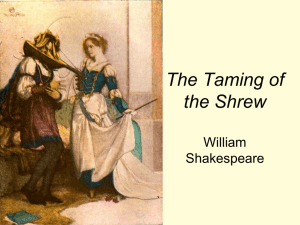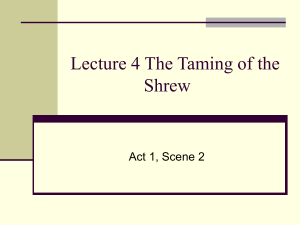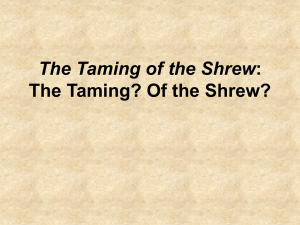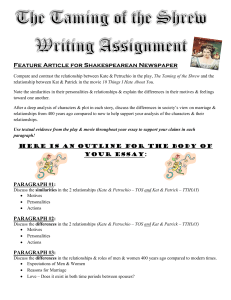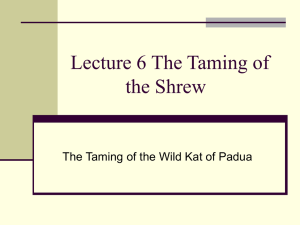The Taming of the Shrew Abstract
advertisement
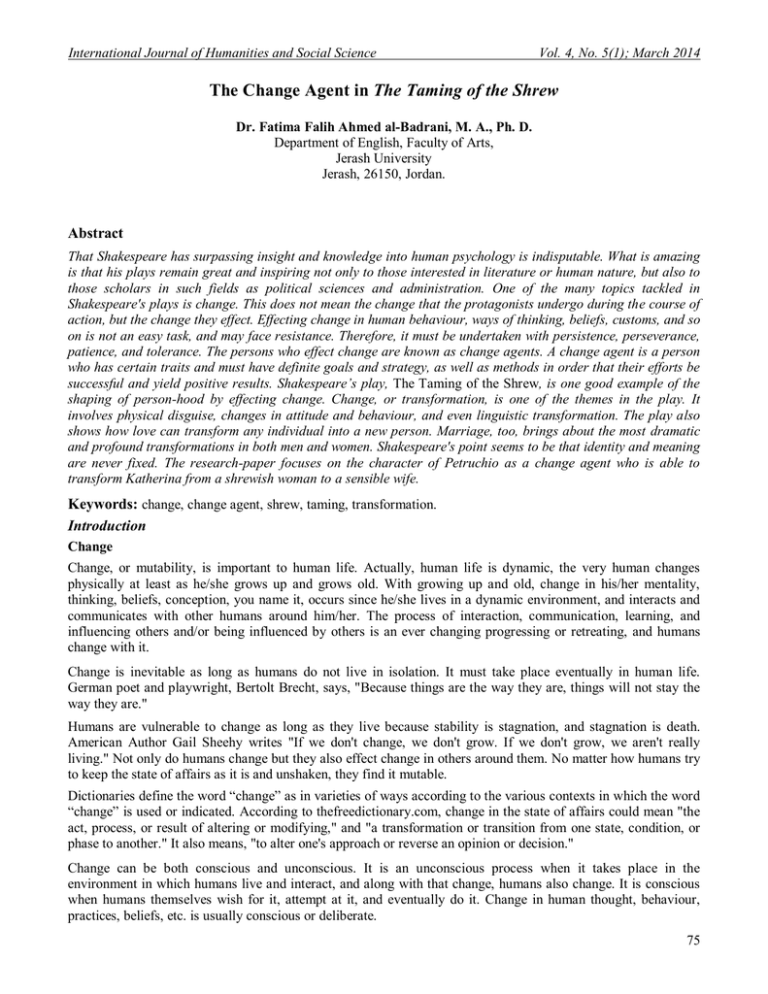
International Journal of Humanities and Social Science Vol. 4, No. 5(1); March 2014 The Change Agent in The Taming of the Shrew Dr. Fatima Falih Ahmed al-Badrani, M. A., Ph. D. Department of English, Faculty of Arts, Jerash University Jerash, 26150, Jordan. Abstract That Shakespeare has surpassing insight and knowledge into human psychology is indisputable. What is amazing is that his plays remain great and inspiring not only to those interested in literature or human nature, but also to those scholars in such fields as political sciences and administration. One of the many topics tackled in Shakespeare's plays is change. This does not mean the change that the protagonists undergo during the course of action, but the change they effect. Effecting change in human behaviour, ways of thinking, beliefs, customs, and so on is not an easy task, and may face resistance. Therefore, it must be undertaken with persistence, perseverance, patience, and tolerance. The persons who effect change are known as change agents. A change agent is a person who has certain traits and must have definite goals and strategy, as well as methods in order that their efforts be successful and yield positive results. Shakespeare’s play, The Taming of the Shrew, is one good example of the shaping of person-hood by effecting change. Change, or transformation, is one of the themes in the play. It involves physical disguise, changes in attitude and behaviour, and even linguistic transformation. The play also shows how love can transform any individual into a new person. Marriage, too, brings about the most dramatic and profound transformations in both men and women. Shakespeare's point seems to be that identity and meaning are never fixed. The research-paper focuses on the character of Petruchio as a change agent who is able to transform Katherina from a shrewish woman to a sensible wife. Keywords: change, change agent, shrew, taming, transformation. Introduction Change Change, or mutability, is important to human life. Actually, human life is dynamic, the very human changes physically at least as he/she grows up and grows old. With growing up and old, change in his/her mentality, thinking, beliefs, conception, you name it, occurs since he/she lives in a dynamic environment, and interacts and communicates with other humans around him/her. The process of interaction, communication, learning, and influencing others and/or being influenced by others is an ever changing progressing or retreating, and humans change with it. Change is inevitable as long as humans do not live in isolation. It must take place eventually in human life. German poet and playwright, Bertolt Brecht, says, "Because things are the way they are, things will not stay the way they are." Humans are vulnerable to change as long as they live because stability is stagnation, and stagnation is death. American Author Gail Sheehy writes "If we don't change, we don't grow. If we don't grow, we aren't really living." Not only do humans change but they also effect change in others around them. No matter how humans try to keep the state of affairs as it is and unshaken, they find it mutable. Dictionaries define the word “change” as in varieties of ways according to the various contexts in which the word “change” is used or indicated. According to thefreedictionary.com, change in the state of affairs could mean "the act, process, or result of altering or modifying," and "a transformation or transition from one state, condition, or phase to another." It also means, "to alter one's approach or reverse an opinion or decision." Change can be both conscious and unconscious. It is an unconscious process when it takes place in the environment in which humans live and interact, and along with that change, humans also change. It is conscious when humans themselves wish for it, attempt at it, and eventually do it. Change in human thought, behaviour, practices, beliefs, etc. is usually conscious or deliberate. 75 © Center for Promoting Ideas, USA www.ijhssnet.com In a nutshell, change is an option when there is a recurring failure somewhere, and is being eyed as one of the solutions to problems. Therefore, the definition of change is the act becoming different. The first step towards change is awareness. The second step is acceptance. Abraham Maslow says, "What is necessary to change a person is to change his awareness of himself." Make Change Happen Conscious or deliberate change occurs when one desires to effect change in himself/herself, or in others for a variety of reasons, though usually it is someone who desires to effect change in others. It is affected through different approaches according to the status quo. In order to reach desired results, change must not be abrupt or else it will yield unfavourable consequences. That is because, normally, change is not easily accepted. Some individuals deter change for different reasons. Judith M. Bardwick in "Create Awareness; Create Change" (2010), states that it is a fact that in any attempt to change something, opposition is also always there. Managing change means managing people's fear. Change is natural and good, but people's reaction to change is unpredictable and irrational. Change can be managed if done right (pp. 114 – 115). Thus change should be undertaken with patience and not without hardship, even sacrifices. The first important thing in carrying out change is to set the goal, implement the plan and follow up the process to reach the desired result. A change agent must not forget that feelings are much more important than facts in getting a return for change, and core change is always unsettling. He/she must create the fear that not changing is much more dangerous than changing. Then, it is time to create hope. His/her message must be that all parties must work together to achieve the best results. The task is to regain the perspective that people are a major asset and the agent must behave in ways that tell them they are valuable and important. Ideas, attitudes, and behaviours must be aligned, converging on the single idea that making commitments to people and gaining commitment from them is the only way they can succeed. When most people share that value and agree on that goal, lots of ways to reinforce commitment and engagement will be generated. No one change agent can make things happen alone. To make things happen, he/she must gain power from those who can decide as well as from the number of people who will benefit from change. Change leaders must find these potential allies wherever they are. Then, in order to make things happen, he/she needs a fundamental plan that is direct and focused (Bardwick, p. 116). It is better, therefore, that change be carried out gradually as follows: 1. Motivation and Awareness: The first task for change makers is to create real awareness in the targeted people that (1) their practices create serious problems with powerful negative effects that hinder progress, and (2) there are policies that make success much more likely (Bardwick, p. 118). Generating the motivation for change and the specific ideas about how to succeed are only the starting points. Ghanim Finjan Musa (1990) suggests in his book (in Arabic) Modern Trends in Human Resource Management, that to bring about change, a human is motivated to rid the current thoughts, behaviour, practices, beliefs, etc. and is encouraged to change himself/herself. Leaving the stable state to enter the new one is achieved either by creating in the targeted person doubt in the validity and reliability of their thoughts, behaviour, practices, beliefs, etc. by proving the opposite, or creating in them a sense of guilt or anxiety if they continued without changing themselves. It could also be achieved by letting them feel that accepting change would be of great advantage that they would benefit both emotionally and materially (p. 90). In "What Makes a Good Change Agent," Dagmar Recklies (2001) also states that the targeted persons develop an awareness of their situation and understand why the desired change is desired. This is very much like unfreezing of ice or melting of butter to prepare the targeted persons for the new state. 2. Desire and Transformation: the targeted person is now ready and willing for change. Therefore, he/she is supposed to be provided with information that acquaints him/her to the new thoughts, behaviour, practices, beliefs, etc. and given the proper training or instruction to accept them (Musa). 3. Re-stabilising: this is achieved after making sure that the targeted person is willing to accept change. This includes making him/her feel that the new thoughts, behaviour, practices, beliefs, etc. are good and convenient for their life; and making sure that he/she is employing and benefiting from the new state of affairs in daily activities (Musa, p. 91). 76 International Journal of Humanities and Social Science Vol. 4, No. 5(1); March 2014 It is nevertheless clear that both pressure and support are necessary for success. M. Fullan and S. Steigelbauer (l991) find that individuals usually think of pressure as a bad thing, and support as good. Yet, there is a positive role for pressure in change. There are many forces maintaining the status quo. When change occurs, it is because some pressure has built up that leads to action. During the change process, interaction among implementers serves to integrate both pressure and support. Successful change projects always include elements of both pressure and support. Pressure without support leads to resistance and alienation; support without pressure leads to drift or waste of resources (pp. 90 – 92). Change Agent Change cannot be carried out without one who works towards achieving it. This is called "change agent." The term "change agent" is used for all those persons or groups of persons, who are responsible for implementing change. Wiki.answers.com defines a "change agent" as being more usually an individual, or a group of individuals, who acts as a catalyst for change. That individual usually has the ability to effect change, and the desire to create a difference; he/she is a good, helpful individual who use their skills and relationships to lead and implement change in a community. Change agents do their very best to contribute to the betterment of the situation, and the sustainability of change. They might be an individual from within or outside a community who facilitates change within that community To succeed, leaders of change must have a close understanding of the human side of change — the alignment of the society's culture, values, people, and behaviours — to encourage the desired results, as stated in "Change Management" (n. d.). Qualities of a Change Agent In order to be a successful change agent, an individual must have knowledge of the situation and environment, a value system and self-concept or motivation, a message and clear goals, and the skills or abilities of the change agent. Change agent abilities relate to certain traits in him/her that make him/her effective as a catalyst for change. Change agents must, therefore, be resilient, optimistic, persistent, committed, passionate, patient, emotionally and intellectually intelligent, assertive, persuasive, empathetic, authentic, ethical, self-aware, competent, and curious. He/she must also have courage and integrity (Musa, p. 92). With these abilities change agents can communicate ideas clearly, concisely, and precisely, listen to others and incorporate their ideas and perspectives, and reflect on what is happening to make meaning, gain perspective and understanding. They are also able to engage in civil discourse and debate, mediate and resolve conflicts, and recognise the overall implications of their actions. It is also important that a change agent should know his/her limitations, and challenge the status quo effectively within those boundaries. They can set realistic and clearly defined goals, and see the big picture and the larger goal and understand the need for complete change. Jack and Suzy Welch (2008) see in "What Change Agents Are Made Of" that one of the important things a change agent can do is to adjust to the diverse and changing needs of both individuals and society as a whole, so that he/she can influence the dynamics of individuals and society. He can also cope effectively with change. Change agents always need the ability to get all people affected by the project involved, to ensure their support and commitment. This requires a high competency as the basis for acceptance as well as soft skills, which are often summarized as emotional intelligence. This includes the ability to communicate, to understand, and to take into account opinions and doubts of others. In her article "The Enduring Skills of Change Leaders", Rosabeth Moss Kanter (1999) indicates that the most important thing a leader of change can bring to changing others are passion, conviction, and confidence in others. Change in The Taming of the Shrew Shakespeare's play The Taming of the Shrew is one good example of the shaping of person-hood by effecting change. Transformation, or change, is one of the central and pervasive themes in the play. It can involve physical disguise, changes in attitude and behaviour, psychological changes, and even linguistic mutation. Love can transform any individual into a new person. Marriage incites or brings about the most dramatic and profound transformations in both men and women. This seems to be Shakespeare's point – identity and meaning are never fixed. In the play, Katherina Minola starts off as a rebellious and nonconformist character (especially when compared to her sister Bianca), but ends up evolving from a stubborn shrew into a trustworthy and respectful wife to Petruchio. 77 © Center for Promoting Ideas, USA www.ijhssnet.com Shakespeare uses the plot as well as numerous other techniques such as metaphor, symbolism and tone to establish the transformation of Katherina to show the audience the impact that love can have on one's personality and spirit. Through the course of The Taming of the Shrew, Katherina is transformed from a stubborn character, who believes no one should control her, to a docile, faithful, wife. Through this transformation, Shakespeare portrays one's capacity to change, which is an important part of human nature. The play reveals the wild Katherina lacking respect for her family, herself, and others around her. She is a very rude and vulgar woman without respect to authority. Although depicted as a beautiful woman, she quickly becomes the talk of Padua. According to the article "Success of Petruchio in The Taming of the Shrew" (n. d.), Katherina has found that if she is loud and intolerable she can have her way. She screams and grunts and pushes those who she does not get along with. The general character of Katharine seems to be that of a small child. The play opens with a seemingly unsolvable problem. Katherina is shrew and nobody wants to marry her, therefore, nobody can marry her younger sister, Bianca, unless she marries first. However, nobody is able to do anything to alter her shrewish behaviour. Through-out the beginning of The Taming Of The Shrew (Act I and Act II), Shakespeare presents Katherina as a vigorous and rebellious feminist which results in her being shunned by the society of Padua. An example of people's animosity towards her is when Gremio declares her as a "fiend of hell" (I. i; l. 88) and states that "any man is so very a fool to be married to hell?" (I. i; l. 122). These metaphorical quotes give the audience an understanding as to the type of wife Katherina would be at this stage of the play. Hortensio also says that Katherina is not likely to get a husband unless she is "of gentler, milder mould" (I. i; l. 60), and claims that she is "[r]enowned in Padua for her scolding tongue" (I. ii; l. 96). These quotes give the audience an understanding as to how different people perceive her character before her transformation. On her part, Katherina proves to the audience her stubbornness and unwillingness to bow down to men, when she says to Petruchio after being told to marry on Sunday "I'll see thee hanged on Sunday first". Katherina shouts with such bitterness because she is not used to people telling her what to do (Morgan Clifford, 2011). Thus, the characters of the play are all stuck when the drama opens. But an expert in change management enters, seeking to change the behaviour of Katherina, the shrew; of her family; and of her whole society. Petruchio succeeds splendidly, and gets changed himself during the process. Petruchio, however, comes to the town of Padua in the hopes of "wiving and thriving." He has a clear and definite aim to marry a rich woman. Hortensio suggests that he marry Katherina Minola, as she is very rich and her marriage will allow her sister to marry as well. Petruchio takes an interest in Katherina when he is told that that woman, who they suggest he can marry, is rich and beautiful, but sharp-tongued and hot-tempered, and agrees. Petruchio finds a case that challenges his character. He decides to face the challenge and tame the shrew into a woman that can make a good wife. Petruchio determines to take Katherina as a wife even before he meets her. He is totally taken by Katherina’s personality as Bianca’s beauty and coyness takes the other suitors. It is in Hortensio’s description of Katherina that Petruchio is captured. Hortensio describes her as wealthy, young, beautiful, properly brought up, but intolerably curst, shrewd and "froward," Hortensio: With wealth enough and young and beauteous, Brought up as best becomes a gentlewoman. Her only fault – and that is faults enough – Is that she is intolerable curst, And shrewd and froward so beyond all measure (I. ii; ll. 85 - 89) Though Hortensio finds his description of Katherina repulsive, and Lucentio finds it interesting, as these qualities are considered negative in Katherina, Petruchio claims that she could be "As foul as was Florentius’ love" (I. ii; l. 66), yet he must have her as a wife, and that he was born to tame her. He is impatient to see her, he says, "I will not sleep… till I see her" (I, ii; l. 99). As stated in the article "Petruchio's Desire for Katherina" (n. d.), it seems that he is turned on by the challenge, although no one believed that Petruchio would be able to stand Katherina, Hortensio enquires, “[Who] [w]ill undertake to woo curst Katherine?" (I. ii; l. 177) and Gremio asks Hortensio, "have you told him all her faults?" (I. ii; ll. 180) 78 International Journal of Humanities and Social Science Vol. 4, No. 5(1); March 2014 But Petruchio is stimulated by Katherina’s sharp tongue and harsh actions. He falls in love with her madness and decides he wants to tame her. It turns out in the end that Katherina realizes what Petruchio is really trying to do. Petruchio as a Change Agent Most people know what a shrew is and to tame one needs patience and confidence in order to be able to tame it and bring it up the way one wants it. The change agent, as is mentioned earlier, must have certain traits that enable him to undertake the task of effecting change. Fortunately for Petruchio, he has several traits that make him a change agent. Petruchio's Traits As a change agent, Petruchio is a clever man who sees beyond appearance because he uses it himself. In "CliffsNotes on The Taming of the Shrew," Kate Maurer (n.d.), indicates that Petruchio demonstrates he is a quick and clever thinker after being rejoined by Baptista, Gremio, and Tranio, who question his and Katherina's relationship in their first meeting. Petruchio says "she … still be curst in company” (II. i; l. 294), but claims that in private "she hung about my neck, and kiss on kiss" (II. i; l. 297), which is far from true. This highly comic lie shows that, although in reality he is merely inventing a story of what has just happened, he is the only man who has the intelligence to compete with Katherina. Petruchio would not take things at face value, but seems to love challenge and enjoy verbal sport and a nonconventional sense of humour that challenges his wit. He constantly surrounds himself with challenging people. This can be seen in his servants who are neither tame nor conforming. An example is when Petruchio and his servant man Grumio get into a disagreement about knocking on the gate (I. ii; ll. 14ff). Another instance is Petruchio’s methods to “woo” Katherina. Though he is serious about his wooing, his methods are game-like and outrageous. He is boisterous and often threatens violence, but he would not hurt. Another example is when he shows up late to the wedding, or beats up Grumio because Katherina’s horse stumbles. Burton Raffel (2005), in his "Introduction" to The Taming of the Shrew, describes Petruchio as a wonderfully drawn stage figure, vastly loud and energetic, outlandish, bold, utterly single-minded and determinedly two-dimensional (p. xxviii). It seems his perfect match would be a woman who could produce a challenge and sharpen his wit. Actually, Petruchio's love of challenge makes him eager to transform Katherina. He recognizes, respects, and desires Katherina’s strength of character, which is a challenge and test to his masculine power. He, nevertheless, does not want her to be conforming. Had docility and wealth been his only goals, or had he wanted someone conforming, he would have gone more for someone like Bianca. Moreover, he also seems like he would be disappointed if Katherina were tamed to easily, because he seems to enjoy the challenge. He says that taming Katherina is a task compared to the hardships of war or the sea, Petruchio: Why came I hither but to that intent? Think you a little din can daunt mine ears? Have I not in my time heard lions roar? Have I not heard the sea, puffed up with winds, Rage like an angry boar chafèd with sweat? Have I not heard great ordnance in the field, And heaven's artillery thunder in the skies? Have I not in a pitchèd battle heard Loud 'larums, neighing steeds, and trumpets' clang? And do you tell me of a woman's tongue, That gives not half so great a blow to hear As will a chestnut in a farmer's fire? (I. ii; ll. 192 – 203) This love of challenge shows that, as a change agent, Petruchio is strong willed who would not be discouraged. He is also a man who is very confident in himself and does not need someone to encourage him. He is so confident that he never voices any doubt that he can tame Katherina ("Petruchio's Desire"). He has the confidence and ability to effect change, and he has the satisfaction of discovering a worthy partner in Katherina. Thus, the slap he receives from Katherina later or the sharp words when she says "I’ll see thee hanged on Sunday first!" (II. i; l. 288) after telling her of the wedding arrangement, do not seem to discourage the strong willed Petruchio at all. 79 © Center for Promoting Ideas, USA www.ijhssnet.com Petruchio is also resilient and tolerant as a change agent. When his first wooing method is met by insults from the shrew Katherina he is not discouraged by failure but tries a different approach. The approach works, with Katherina responding positively, and Petruchio continues to implement his wooing tactics until she softens and overcomes her resistance to him, as referred to in "Katherine in The Taming of the Shrew: A Transformation from Stubborn to Obedient" (2006). Katherina becomes his wife, and Petruchio is able to achieve his original goals showing that determined persistence can bring success. Another aspect of Petruchio's character as a change agent is that he is patient and persistent. He is ready to go back to the beginning of the process at any time Katherina shows signs of falling off. He never loses his temper with her and always insists on his love for her. Each time Katherine displays her shrew-like behaviour in response to his wooing, Petruchio must regroup and redefine his plan of attack. The lesson is to adapt to a changing environment ("Change Management"). He considered himself a falconer and uses the metaphor of taming a hawk to explain his strategy (Maurer). The training, which results in a mutual trust between man and bird, requires immense energy, patience, and dedication from the tamer. Petruchio puts the same kind of energy and patience into "taming" Katherina, even though he would be exhausted, he never shows it. One of the qualities of a change agent is that he/she should be persuasive and, therefore, must have appeal. Petruchio as a change agent is so likeable. This can be seen in his servants who like him very much and enjoy his entertainments. Maurer finds that part of what makes him likeable is his apparent disregard for social decorum, particularly when he works to get Katherina to abandon her shrewish nature. For instance, he refuses to treat Katherina as a woman of her status traditionally expects to be treated because she is not behaving as one. Rather, Petruchio's treatment of Katherina is based on how she behaves. Another good example of Petruchio's willingness to go against convention is when he arrives late for the wedding wearing unconventional attire. It is this exact willingness to go against convention that makes Petruchio likeable and persuasive. Besides, Petruchio is a straightforward man, with a definite goal in mind, a straightforward approach, and no nonsense attitude. When he arrives at Padua, he has clear and definite goals in his mind. These goals are to get a rich wife and to gain experience, Petruchio: And I have thrust myself into this maze, Happily to wive and thrive as best I may. Crowns in my purse I have, and goods at home, And so am come abroad to see the world. (I. ii; ll. 52 – 55) Petruchio's Strategy Once Petruchio identifies Katherina as the target, he begins to pursue her with all the creativity and imagination that he can put together. She is rich and shrew, and taming her is a new experience for him. Thus he starts to work towards fulfilling these goals. In attempting to tame Katherina, Petruchio implements various tactics and approaches. The first of these tactics is the verbal approach. Tita French Baumlin (1989) indicates that first he plans he will contradict everything she says, not allowing her to express herself. Petruchio shoots her down whenever she speaks. This is part of his technique to tame her, that is, to employ verbal taming to match her language with rhetoric that specifically undermines her uncontrolled nature, Petruchio: Say that she rail; why then I'll tell her plain She sings as sweetly as a nightingale. Say that she frown, I'll say she looks as clear As morning roses newly washed with dew. Say she be mute and will not speak a word, Then I'll commend her volubility And say she uttereth piercing eloquence. If she do bid me pack, I'll give her thanks As though she bid me stay by her a week. If she deny to wed, I'll crave the day When I shall ask the banns, and when be married. (II. i; ll. 166 – 176) 80 International Journal of Humanities and Social Science Vol. 4, No. 5(1); March 2014 He first started with beating Katherina's language, vowing that no matter what she says, he will purposely misinterpret it, thus "undermining the very basis of the linguistic sign, and disrupting the relationship between signified and signifier" (Baumlin). As a change agent, Petruchio is able to adapt to different situations. He first starts wooing with honeyed compliments, playing puns on her name, referring to her as a "cake" and a "cat," objectifying her in a subtle manner, Petruchio: Nay, not a whit. I find you passing gentle. 'Twas told me you were rough and coy and sullen, And now I find report a very liar, For thou are pleasant, gamesome, passing courteous, But slow in speech, yet sweet as springtime flowers. Thou canst not frown, thou canst not look askance, Nor bite the lip as angry wenches will, Nor hast thou pleasure to be cross in talk, But thou with mildness entertain'st thy wooers, With gentle conference, soft and affable. (II. i; ll. 232 – 241) When she slaps him he is not discouraged by the failure of his wooing method, but he finds he must try a different approach, now more forceful and threatening, he tells her, "I swear I'll cuff you if you strike again" (II. i; l. 214). The approach works, with Katherina responding positively. He then continues to implement his wooing tactics, comparing her to animals. But while he is showing Katherina how ridiculous she is about things, he is also making her feel special, which is something she never felt in life, until she softens and overcomes her resistance to him. That is, language becomes the battleground, with Petruchio emerging as a victor. Grumio says earlier, Grumio: I'll tell you what, sir, and she stand him but a little, he will throw a figure in her face and so disfigure her with it that she shall have no more eyes to see withal than a cat. You know him not, sir. (I. ii; ll. 107 – 110) Grumio assures Hortensio that Petruchio will beat Katherina in a verbal battle of wits. He suggests that Petruchio's words, his "figures" of speech, have the power to alter Katherina like acid might burn and transform a person's face. This anticipates Katherina's transformation from railing shrew to a docile wife, as is seen towards the end of the play when Katherina is made to switch the words "moon" and "sun," and she acknowledges that she will agree with whatever Petruchio says no matter how absurd, Katherina: And be it the moon or sun or what you please; And if you please to call it a rush-candle, Henceforth I vow it shall be so for me. ... [S]un it is not, when you say it is not, And the moon changes even as your mind. What you will have it named, even that it is, And so it shall be so for Katherine. (IV. v; ll.13 – 15 and ll.19 – 22) Here Petruchio has succeeded. From this point, Katherina's language changes considerably from her earlier vernacular; instead of defying Petruchio and his words, she has apparently gives in to his rhetoric and accepts that she will use his language instead of her own – both Katherina and her language have been "tamed" (Baumlin, pp. 237–257). Part of his strategy to change Katherina is converting what happened between them from negative to positive. Petruchio lies and tells everyone that Katherina is gentle, loves him, and has agreed to marry him. He says she was all over him when they were alone, but they think it is best if she pretends to hate him in public. Joel Fineman (2004) indicates that Petruchio's rhetoric is not reserved entirely for Katherina, however. By denying that she is a shrew to others, in Act II, Scene 1; ll. 278 – 290, he effectively changes her reputation. The Katherina of the past (her reputation) is changed as well as the Katherina of the present (her actual self). 81 © Center for Promoting Ideas, USA www.ijhssnet.com Fineman writes, "Katherina's reputation as a shrew is a result of her language and the public perception of her, and Petruchio uses rhetoric to change both" (pp. 399 – 416). Another method of taming Katherina is to take her by surprise when he announces that he is off to Venice, but will be back in Padua to marry Katherina on Sunday. Petruchio skips out of the room leaving Katherina to storm out alone. He surprises her again when he arrives at the wedding late, wearing rags, then he announces his speedy departure, depriving Katherina of the joy of the wedding celebration and banquet. His method is to shock her and awaken her to a new situation. Petruchio decides to show Katherina more shrewishness than hers in order to transform her and make her overcome her bad behaviour. He starts this new method of taming at the wedding ceremony shouting and swearing at the parson. Later, when they went home, Petruchio walks in and acts wildly. One moment he is calling his servants bastards and asses while kicking them around, and the next minute he is telling Katherina to relax and make herself at home (Maurer). Curtis says that Petruchio is more of a "shrew" than Katherina, and Grumio says that Curtis hasn’t seen anything yet. Petruchio seems trying to hold a mirror to Katherina to make her realize the effect of her bad behaviour on others so that she changes. Petruchio, as a change agent, exaggerates Katherina's bad behaviour until she cannot help but see how childish and foolish her actions have been. Petruchio's treatment of Katherina is based on how she behaves. Peter says that Petruchio has put an end to Katherina's bad behaviour by giving her a dose of her own medicine, "He kills her in her own humour" (IV. i; l. 151). Curtis says that Petruchio is in Katherina's room lecturing her on self-control and that Katherina is dumbfounded, like someone who has just woken from a "dream," Curtis: In her chamber, Making a sermon of continency to her, And rails and swears and rates, that she, poor soul, Knows not which way to stand, to look, to speak, And sits as one new-risen from a dream. (IV. i; ll. 153 – 157) Petruchio employs a taming strategy described through a hawking metaphor in which he tells how he has begun his reign over Katherina. Petruchio explains his plan to tame Katherina. He compares himself to a falcon tamer and compares Katherina to a wild bird that needs be tamed. His new courting method this time is to pretend that he is trying to make her feel too good for everything surrounding her. He is going to starve her and deprive her of sleep, all while pretending to have her best interest in mind, until she breaks. This, he says, is the best way to tame a shrew, "This is the way to kill a wife with kindness" (IV. i; l. 179). An example is when they eat dinner he complains, "it engenders choler, planteth anger;/…/Since, of ourselves, ourselves are choleric," (IV. i; ll. 143, 145). However, Petruchio is far from being cruel. When he deprives her of food or sleep, he does not eat or sleep himself. Petruchio's Success as a Change Agent Petruchio succeeds in taming, or more precisely changing, Katherina, though there is much dispute about whether she has really been tamed or not. Most critics say that Katherina is not really tamed. Then, it would rather be better to say that she is changed and not tamed. It is true that Katherina is not subdued (tamed) but has changed a great deal from ignorance about the negative effect of her behaviour to realizing that that behaviour is not helpful and not in her favour. That is exactly what Petruchio has aimed for. He does not want to break Katherina, nor does he want her to lose her energetic mind and independence of character, because he wants a wife that can match him in wit and strength of character. He is genuinely attracted to Katherina precisely because of her independence and vigour. The final scene shows that Katherina has been changed and not crushed. Petruchio has helped Katherina to move to a maturer state of being than her previous one. In an article entitled "Shakespeare's Romantic Shrews," Charles Brooks (1960) suggests that Katherina has matured from girl to wife through burning out her masculine desire to dominate, which is part of the process of maturing (pp. 351 – 356). The fact is that the taming process has become a game and Katherina understands very well how to play it with Petruchio. In attempting to tame (or change) Katherina, Petruchio acts just as a director of a movie. He runs the show, so to speak, governing when his wife will come in and go out, when she will eat and sleep, and even attempts to watch over time itself (Maurer). 82 International Journal of Humanities and Social Science Vol. 4, No. 5(1); March 2014 He very carefully sets up the production, helping move his shrewish wife into desirable mate. In her part, Katherina realizes that her disposition as a shrew is no longer useful to her, or Petruchio has finally convinced her to abandon that behaviour, so she assumes another role — this time the devoted wife. Both Petruchio and Katherina have worked out their own way of living together, and it is a way of equals in wit and humour. In this kind of marriage, Katherina no longer needs to assert her independence and intelligence by shrewish behaviour. It seems to work out in the end when Petruchio and Katherina prove themselves to be a better match than all of the other couples in the play. Because they are so much alike, Katherina takes to Petruchio’s games and words of irony, as in Act IV. v; ll. 37–50. Petruchio and Katherina will have a great time as a couple, although Katherina is not necessarily tamed. Petruchio wanted a woman with similar qualities to his own, to challenge him, sharpen his wits, and keep his interest. Conclusion In The Taming of the Shrew, Petruchio has functioned as a change agent who possesses the qualities that make him one. He has a clear and definite goal in mind and knows exactly how to act towards fulfilling that goal. He has a plan and a straightforward strategy, and follows supple tactics to achieve his goal of "wiving" as best as he may. In his attempt to effect change, Petruchio motivates Katherina, and creates in her the awareness that her behaviour is inappropriate and that she must adopt a new way of behaving. Then he allows Katherina to consider her situation, and have the desire to change. In the end he makes Katherina feel that the new behaviour is good and convenient for her life; and makes sure that she is employing, and benefiting from, the new state in her daily activities. The play also shows how the change agent, Petruchio, tells the audience what he intends to do, makes big change, manages the change process carefully, evaluates its results along the way, and draws general conclusions. References "Change Agent" (n. d.). Retrieved June 19, 2013, from http://wiki.answers.com/Q/What_is_a_change_agent. "Change Agent" Retrieved June 19, 2013, from http://www.processexcellencenetwork.com/glossary/change-agent/. "Change Management" (n. d.). Retrieved June 10, 2013, from http://www.moversandshakespeares.com/our_approach.php?page=topics&third=change_management. "Change" (n. d.). Retrieved June 19, 2013, from http://www.thefreedictionary.com/change. "Katherine in The Taming of the Shrew: A Transformation from Stubborn to Obedient" (2006). Retrieved June 19, 2013, from http://www.bookrags.com/essay-2006/1/6/20179/74070/). "Petruchio’s Desire for Katherine" (n. d.). Retrieved June 19, 2013, <http://www.123HelpMe.com/view.asp?id=2873). "Success of Petruchio in The Taming of the Shrew" (n. d.). Retrieved June 22, 2013, from http://www.123HelpMe.com/view.asp?id=15574 Bardwick, J. M. "Create Awareness; Create Change" in McArthur, S., Baldoni, J., & Goldsmith, M. (2010). The AMA Handbook of Leadership. New York: American Management Association. 114 – 118. Baumlin, T. F. (Summer, 1989). "Petruchio the Sophist and Language as Creation" in The Taming of the Shrew", SEL: Studies in English Literature 1500-1900, 29:2. 237–257. Brecht, B. (n.d.). Retrieved June 19, 2013, from http://www.brainyquote.com/quotes/topics/topic_change2.html.) Brooks, Ch. (1960). "Shakespeare's Romantic Shrews". Shakespeare Quarterly, No.11. 351 – 356. Clifford, M. (2011). "The Taming of the Shrew - Katherina's Transformation". StudyMode.com. Retrieved June 19, 2013, from http://www.studymode.com/essays/The-Taming-Of-The-Shrew-763485.html. Fineman, J. (2004) "The Turn of a Shrew", in Russ McDonald (editor), Shakespeare: An Anthology of Criticism and Theory, 1945– 2000 Oxford: Blackwell. 399 – 416. Fullan, M., and Steigelbauer, S. (l991). The New Meaning of Educational Change (2nd ed.). New York: Teachers College Press. Maslow, A. (n. d.). Retrieved June 19, 2013, from http://www.brainyquote.com/quotes/topics/topic_change.html. Maurer, K. (n. d.). "CliffsNotes on The Taming of the Shrew". Retrieved June 19, 2013, from http://www.cliffsnotes.com/literature/t/the-taming-of-the-shrew/play-summary. Maurer, K. (n. d.). Retrieved June 19, 2013, from http://www.coolatta.org/barrons/the_taming_of_the_shrew) Moss Kanter, R. (Summer, 1999). "The Enduring Skills of Change Leaders" Leader to Leader, 13. 15 – 22. Musa Gh. F. (1990). Modern Trends in Human Resource Management. Baghdad: Al-Raya Printing Press. Recklies, D. (2001). "What Makes a Good Change Agent". retrieved June 19, 2013, from http://www.themanager.org/Strategy/change_agent.htm. Shakespeare, W., Bloom, H., & Raffel, B. (2005). The Taming of the Shrew. New Haven [Conn.]: Yale University Press. Shakespeare, W., Thompson, A. (1995). The Taming of the Shrew. Cambridge: Cambridge University Press. Quotes throughout are from this edition. Sheehy, G. (n. d.). Retrieved June 19, 2013, from http://www.brainyquote.com/quotes/topics/topic_change.html. Welch, J. and S. (2008). "What Change Agents Are Made Of". Retrieved June 19, 2013, from http://www.businessweek.com/stories/2008-10-08/what-change-agents-are-made-of. 83
